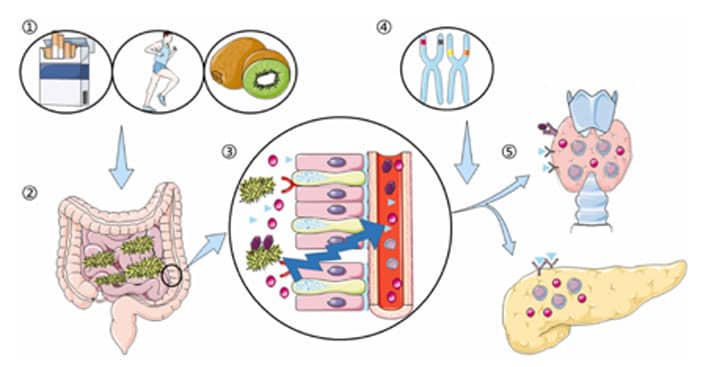Hashimoto’s thyroiditis
Hashimoto’s thyroiditis (synonyms: autoimmune thyroiditis Hashimoto, struma lymphomatosa Hashimoto, Hashimoto’s disease) is a chronic thyroid disease in which the body’s own antibodies attack the organ. In Germany, Hashimoto’s antibodies can be detected in up to 5% of the population, but not all of these people are recognised as Hashimoto’s patients with symptoms.
In the development and progression of Hashimoto’s disease, both individual genetic predisposition and environmental factors play a significant role. The latter can be influenced and can be utilised for the prevention and treatment of Hashimoto’s disease.
In this autoimmune disease (Hashimoto’s autoimmune thyroiditis), antibodies are directed against the thyroid tissue, leading to chronic inflammation in the course of which the organ is destroyed and can no longer fulfil its function. This often leads to a slow progression of the disease, which is sometimes clinically inconspicuous for a very long time, culminating in the development of hypothyroidism. If the disease occurs together with Graves’ disease, hyperthyroidism can also be the result.
Hypothyroidism (underactive thyroid) can manifest itself, for example, through cool, dry skin and increased chills, as well as increased fatigue, concentration problems, constipation or weight gain. The disease should also be considered in the case of depressive moods. A goitre can also develop.
Hyperthyroidism (overactive thyroid) can lead to warm, moist skin and an intolerance to heat. Restlessness and irritability, sleep disorders and rapid fatigability can be further consequences. It can also lead to an accelerated resting pulse (tachycardia), palpitations (“heart stumbling”), weight loss and diarrhoea.
An autoimmune disease rarely occurs alone
Hashimoto’s thyroiditis is often associated with other autoimmune diseases. The term “Polyglandular autoimmune syndromes” describes the joint occurrence of Hashimoto’s thyroiditis, type 1 diabetes mellitus, Addison’s disease and possibly other autoimmune diseases.
Hashimoto’s thyroiditis is diagnosed by the doctor using typical symptom constellations and various laboratory tests, such as TPO-AK (thyroid peroxidase antibodies) or Tg-AK (thyroglobulin antibodies). Of course, the normal thyroid parameters are also determined: TSH (thyroid stimulating hormone), fT3 (free triiodothyronine) and fT4 (free tetraiodothyronine) and, if necessary, rT3.
Conventional Hashimoto’s therapy
The disease is conventionally treated with lifelong thyroid hormone replacement therapy. The first step is to determine the individual dose, which is based on the TSH value and, above all, the patient’s subjective well-being. Regular check-ups should be carried out, as the body’s own LT4 production decreases with age and the dose must be adjusted.
Advanced therapeutic approaches for Hashimoto’s thyroiditis in integrative medicine
Various approaches from complementary and alternative medicine (CAM) are now also being researched. The focus here is on factors that favour the development of Hashimoto’s thyroiditis and other autoimmune diseases, and others that can make their occurrence less likely. There are also various promising approaches for favourably influencing the course of an existing disease and achieving improvements in various areas. At the Berlin Thera Praxisklinik for Integrative Medicine, your doctor will support you with expertise from conventional medicine and complementary and alternative medicine and will draw up an integrative and individualised treatment plan. This is based on your personal needs and possibilities and is implemented by our interdisciplinary team at Mommsenstrasse 57. In addition to the medical measures, we also integrate psychological counselling, nutritional advice and coaching in the sense of a holistic treatment approach in order to actively support you in making lifestyle changes.

Researchers report in recent reviews123 on various ways to influence thyroid function by optimising gut health.
Patients with Hashimoto’s thyroiditis are more likely to have an altered gut microbiome
How environmental factors and behaviour (1) affect the development and course of endocrine disorders via the gut microbiome (2) and gut (3) under the influence of genetics (4).
Graphic courtesy of the author: Fenneman et al. 2020 Gut microbiota and metabolites in the pathogenesis of endocrine disease; Biochemical Society Transactions (2020) doi.org/10.1042/BST20190686
Firstly, a healthy gut microbiome is an essential prerequisite for a healthy immune system and optimal thyroid function4. The direct relationship between the gut and the thyroid gland is the subject of recent research and is described under the term “thyroid-gut axis”. In leaky gut syndrome, for example, the intestinal barrier function is restricted to such an extent that antigens activate the immune system in a harmful way. Chronic inflammation is usually the result. You can imagine this as a constant smouldering fire that people often don’t even notice themselves.
This process also produces free radicals that trigger oxidative stress, which in turn has a negative impact on almost all systems in the body and is associated with many ailments.
In our practice, we use special diagnostics in collaboration with selected laboratories to identify any disorders in this area and to remedy them with prebiotics and probiotics, as well as with changes in dietary habits and therapies to support detoxification functions.
Patients with Hashimoto’s thyroiditis can benefit from fasting cures or intermittent fasting
You can also do something for your intestinal health by fasting or intermittent fasting. However, such measures should be discussed with a doctor in advance if you have a serious underlying illness in order to recognise any individual risks and guide you safely through the process.
Even if you are not suffering from an acute or chronic illness, it is often possible to gain more energy through these relatively simple measures in order to bring more vigour into everyday life and work.
Vitamin D levels are still too low in around 60% of the population in Germany
Furthermore, it is important that essential vitamins and minerals are not only available in sufficient quantities, but can also be absorbed. Vitamin D regulates the immune response, iodine, iron and copper are necessary for the synthesis of thyroid hormones and zinc and selenium are needed by the body to convert T4 (storage form of thyroid hormone) into T3 (active form of thyroid hormone). The amino acid tyrosine is also essential for thyroid function.
In Germany, the vitamin D levels measured in serum are below the target value of 50nmol/L in approx. 60% of the adult population. In 30% of the population, a value below 30nmol/L has even been measured, a range in which various diseases occur more frequently.
Values above 100nmol/L can reduce the likelihood of developing cancer, high blood pressure is easier to control and overall mortality decreases5. Vitamin D overdose is only to be expected from serum values of 375nmol/L and above.
In addition to determining the vitamin D level, our comprehensive laboratory diagnostics also include an iodine load test and determination of the hormone status using saliva tests.
Any deficiencies are compensated for with natural food supplements and infusion therapies. A Cochrane review in 2016 already showed that dietary supplements can have a positive influence on the course of Hashimoto’s thyroiditis.
We usually supplement our infusion therapies with the Me2vie system, which uses high-frequency currents to specifically increase metabolic activity, among other things. In this way, the substances provided to the body are better absorbed.
Detoxification is also part of the treatment for Hashimoto’s thyroiditis

As heavy metals are very closely related to minerals, diagnostics and therapy in this area are also standard at the Berliner Thera Praxisklinik. In order to eliminate heavy metals and other environmental toxins, we use various systems that have been tried and tested for years. These include infusion therapy with chelators such as DMPS, CaNa-EDTA and others, as well as our in-house therapeutic apheresis.
Not all environmental factors that play a role in the development of the disease can be influenced. However, plastic can be reduced, especially in connection with food.
The German Federation for the Environment and Nature Conservation (BUND) has been explaining the effects of plasticisers such as bisphenol A on the endocrine system for many years and provides a valuable decision-making aid for the supermarket aisle in the form of the ToxFox app. The Environmental Working Group (EWG) has also been issuing warnings for a very long time, including about the effects even at low doses. Although there is still no scientific consensus on a direct link between hormonally active plasticisers and Hashimoto’s thyroiditis in particular, there are various indications that the substances could have an influence.
Help from nature: medicinal plants for Hashimoto’s patients
Phytotherapy (herbal medicine) is another broad field of naturopathy in which useful therapy supplements for Hashimoto’s thyroiditis can be found. Studies can now also be found on individual plants.
Here are two examples
- In a small study with 50ml of Aloe Vera6 Barbadensis Miller juice daily, thyroid function was significantly improved and the number of thyroperoxidase autoantibodies was significantly reduced.
- In another study, Nigella sativa7 (real black cumin) led to significant improvements in body weight (BMI) as well as in TSH, thyroperoxidase autoantibodies and T3 levels.
“Finding your inner centre” – using relaxation techniques to improve blood values in Hashimoto’s thyroiditis
As with all diseases, stress plays a decisive role in Hashimoto’s thyroiditis. On the one hand, stress favours the development of many clinical pictures; on the other hand, an existing acute or chronic condition naturally causes stress in those affected.
In a randomised, controlled study8 with 60 patients suffering from Hashimoto’s thyroiditis, an eight-week stress reduction programme showed significant effects. Compared to the control group who had not taken part in the programme, there were significant improvements in the anti-thyroglobin titres in the blood, in the stress, depression and anxiety levels measured by a questionnaire and in the development of a healthier lifestyle.
It becomes clear that there is a whole range of approaches to tackling the disease.
If you would like professional support, our doctors will be happy to get to know you in a 10-minute initial consultation and advise you on the options available at our practice in Berlin. You are also welcome to make an appointment for an initial consultation directly.
You can find out what you can expect from us if you decide to undergo treatment at Thera Praxisklinik here.
Sources:
HEROLD Internal Medicine 2020
Anvil
References:
- Knezevic, J., Starchl, C., Tmava Berisha, A. & Amrein, K. Thyroid-Gut-Axis: How Does the Microbiota Influence Thyroid Function? Nutrients 12, 1-16 (2020).
- Fenneman, A. C. et al. Gut microbiota and metabolites in the pathogenesis of endocrine disease. Biochem. Soc. Trans. (2020) doi:10.1042/bst20190686.
- Virili, C., Fallahi, P., Antonelli, A., Benvenga, S. & Centanni, M. Gut microbiota and Hashimoto’s thyroiditis. Rev. Endocr. Metab. Disord. 19, 293-300 (2018).
- Fröhlich, E. & Wahl, R. Microbiota and Thyroid Interaction in Health and Disease. Trends Endocrinol. Metab. 30, 479-490 (2019).
- Saternus, R., Vogt, T. & Reichrath, J. A critical appraisal of strategies to optimize vitamin d status in germany, a population with a western diet. Nutrients 11, 1-22 (2019).
- Metro, D., Cernaro, V., Papa, M. & Benvenga, S. Marked improvement of thyroid function and autoimmunity by Aloe barbadensis miller juice in patients with subclinical hypothyroidism. J. Clin. Transl. Endocrinol. 11, 18-25 (2018).
- Farhangi, M. A., Dehghan, P., Tajmiri, S. & Abbasi, M. M. The effects of Nigella sativa on thyroid function, serum Vascular Endothelial Growth Factor (VEGF) – 1, Nesfatin-1 and anthropometric features in patients with Hashimoto’s thyroiditis: A randomized controlled trial. BMC Complement. Altern. Med. 16, 1-9 (2016).
- Phelan. Stress Management in Women with Hashimoto’s thyroiditis: A Randomized Controlled Trial Zoe. Physiol. Behav. 176, 139-148 (2018).
Your contact persons
Contact and appointment possible at any time
Do one or more of the above points apply to you and would you like to do something for your health? Are you curious? Please feel free to contact us by phone to make an appointment.
You can reach us according to our opening hours at tel. 030 79016533. We look forward to your call or message.











